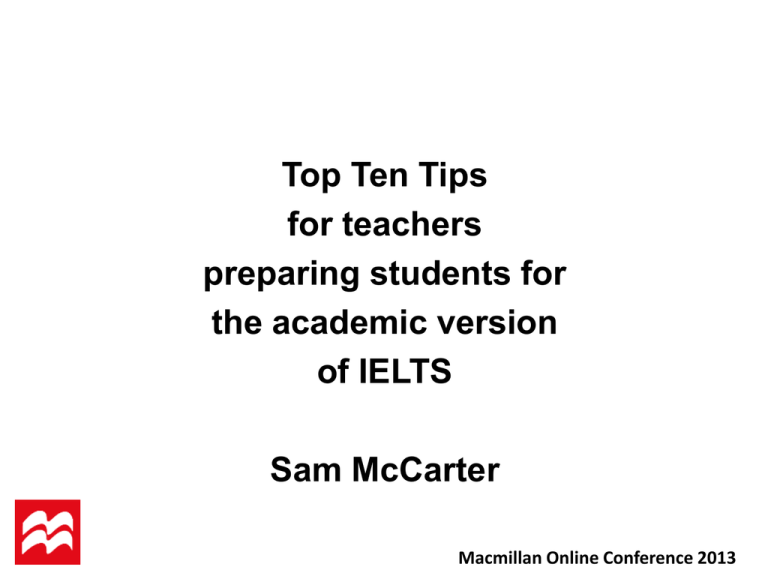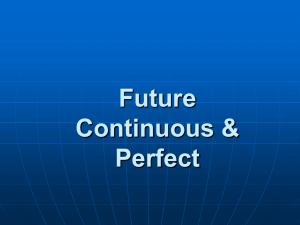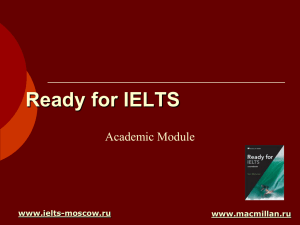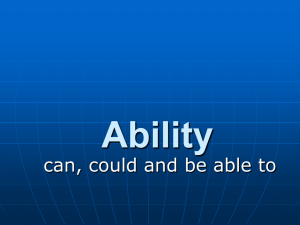SamMcCarter-TopTenTipsforTeachers
advertisement

Top Ten Tips for teachers preparing students for the academic version of IELTS Sam McCarter Macmillan Online Conference 2013 Abstract The presentation will look at the Top Ten Tips to help students improve their chances of obtaining a higher score in the academic version of the IELTS exam. The focus will be on increasing students’ awareness of organization and flexibility so that they can use what they know from the grammar and vocabulary point of view efficiently across the four components, listening reading writing and speaking. Macmillan Online Conference 2013 Tip 1 Reading Text navigation Macmillan Online Conference 2013 Types of passages Exposition/ Argumentation/ Historical biographical Text features • Time relationships • Problem and solution • Cause and effect • Classification • Comparison and contrast • Argument Macmillan Online Conference 2013 • • • • • • • • • Description- processes/ sequencing Narrative Instruction Definition Explanation Exemplification Generalization and specificity Drawing conclusions Rhetorical organisation (Weir, C et al. 2009. The relationship between academic reading construct as measured by IELTS and the reading experiences of students in their first year of study at a British university. IELTS Research Reports 9: 109.) Macmillan Online Conference 2013 The skills that students need to navigate IELTS reading passages efficiently -(surveying) -prediction -skimming -scanning -close reading Macmillan Online Conference 2013 • distinguishing between: -factual and non-factual information -important and less important items -relevant and irrelevant information -explicit and implicit information -ideas examples and opinions -drawing inferences and conclusions -deducing unknown words Macmillan Online Conference 2013 -understanding graphic presentation (data, diagrams, etc.) -understanding text organisation and linguistic/ semantic aspects, e.g. relationships between and within sentences (e.g. cohesion) -recognising discourse/ semantic markers and their function (Jordan, R.R. 1997. English for Academic Purposes: A guide and resource book for teachers. Cambridge: Cambridge University Press.) Macmillan Online Conference 2013 Tip 2 Awareness of information sequences Past/ Present/ Future Problem/ Solution Cause/ Effect/ Solution Action/Purpose General/ Specific Opinion/ proof/ Conclusion Macmillan Online Conference 2013 Tip 3 Writing Task 1 Awareness of : the purpose of the task what is being assessed Public marking scores the sets of data/ maps/ processes the structure and content expected Macmillan Online Conference 2013 Task 1 Checklist • Tense range: Simple Present/ Past/ Present Perfect/ Simple Future/ Future Perfect • Comparison and contrast • Complex sentences: conjunctions/ adverbs • Vocabulary range: verbs of rise/ fall • Writing introductions/ • Overviews/ Trends • Noun phrases/ nominalization -synonyms/ paraphrases • Singular/ plural • Active/ Passive • General v specific Macmillan Online Conference 2013 Tip 4 Awareness of nominalization • Task 1 and across IELTS Car sales rose gradually in the UK between 2005 and 2010. There was a gradual rise in car sales in the UK between 2005 and 2010. • Writing Task 2: The role of technology in the workplace ... Some people think that the impact of modern media on young people’s lives is greater than ... Macmillan Online Conference 2013 • Paragraph/ Section headings The impact of wilderness tourism The role of the media in young people’s lives ... • Speaking: Do you think that the impact of modern media on young people’s lives is greater than ... ? Listening note taking: the 3 ______ of pollution on the marine habitat in New Zealand Macmillan Online Conference 2013 Tip 5 Writing Task 2 Skills/ Transfer awareness • Understanding question types: Discuss both these views and give your own opinion. To what extent do you agree or disagree with this opinion? • Reading the whole rubric: Give reasons for your answer and include any relevant examples from your own experience. Macmillan Online Conference 2013 Tip 6 Understanding the tasks • Understanding question types: Discuss both these views and give your own opinion. To what extent do you agree or disagree with this opinion? • Reading the whole rubric: Give reasons for your answer and include any relevant examples from your own experience. Macmillan Online Conference 2013 Tip 7 Awareness of paragraphs The number of paragraphs Coherence/ cohesion Paragraph structure Trigger’ words to create a template rather than a writing vacuum: Because/ For example/ For example, if/ Like / such as But/ However/ As a result/ however/ Moreover And their synonyms Macmillan Online Conference 2013 Tip 8 Creating/ gathering ideas • Brainstorming • Word association • Perspectives: social, environmental, legal, financial/ economic, educational ... • Recycling ideas/ concepts • Question creation • Start with a word: poverty Macmillan Online Conference 2013 Tip 9 Speaking Skills transfer Writing/Speaking Organization Part 2: making notes Part 3: development of answer to question Macmillan Online Conference 2013 Tip 10 Listening Prediction skills Use of questions Awareness of structure and nominalization Listening note taking: the 3 ______ of pollution on the marine habitat in New Zealand (See Tip 5 Slide 14) Macmillan Online Conference 2013 Thank you! Macmillan Online Conference 2013





